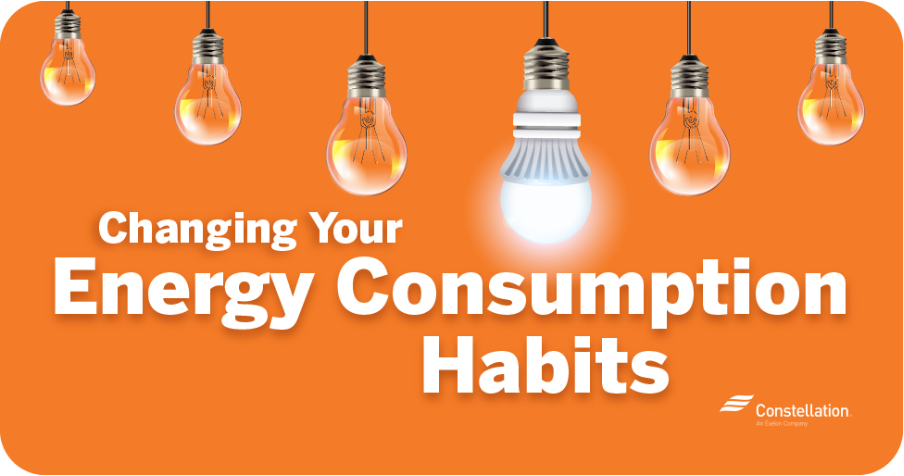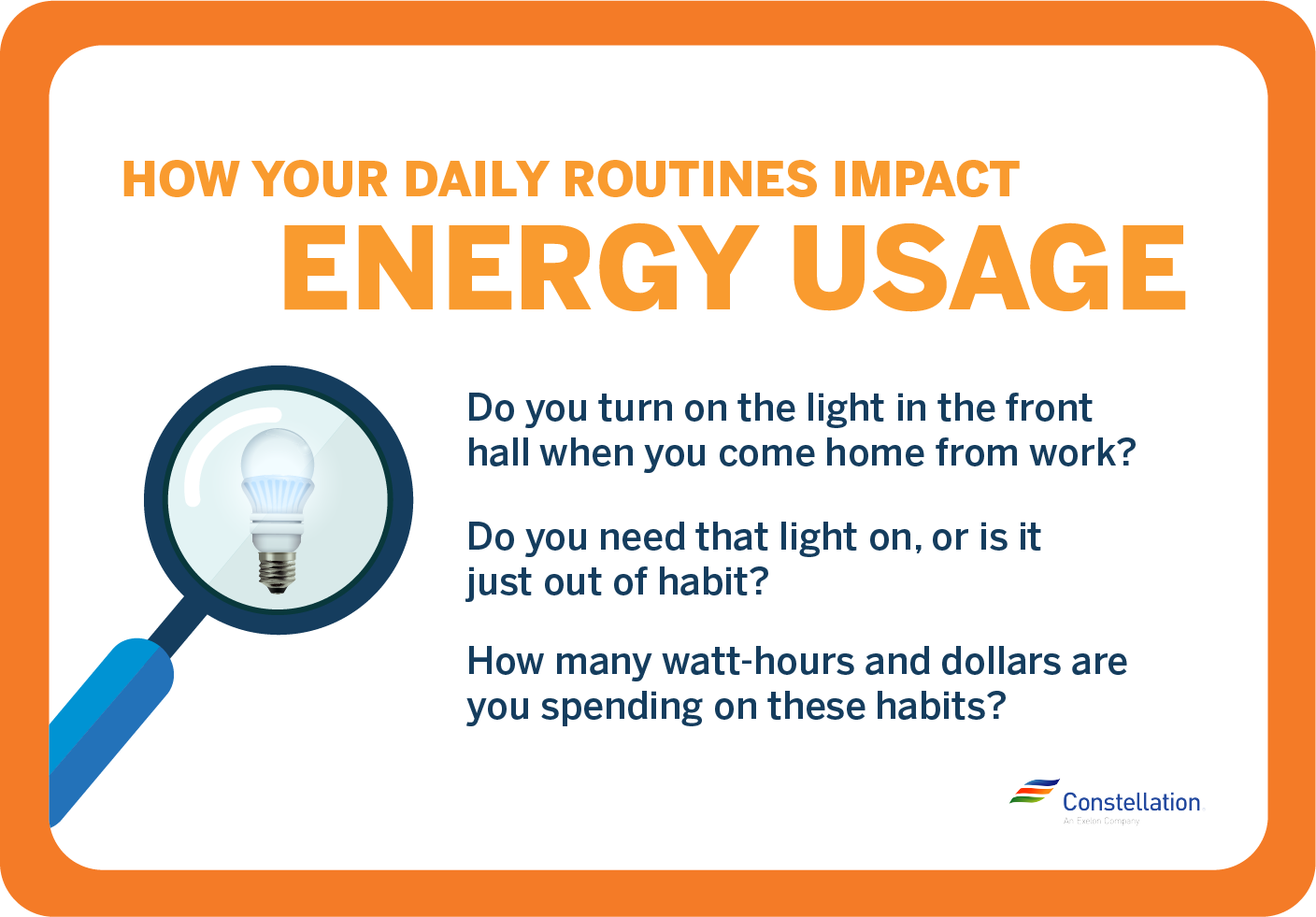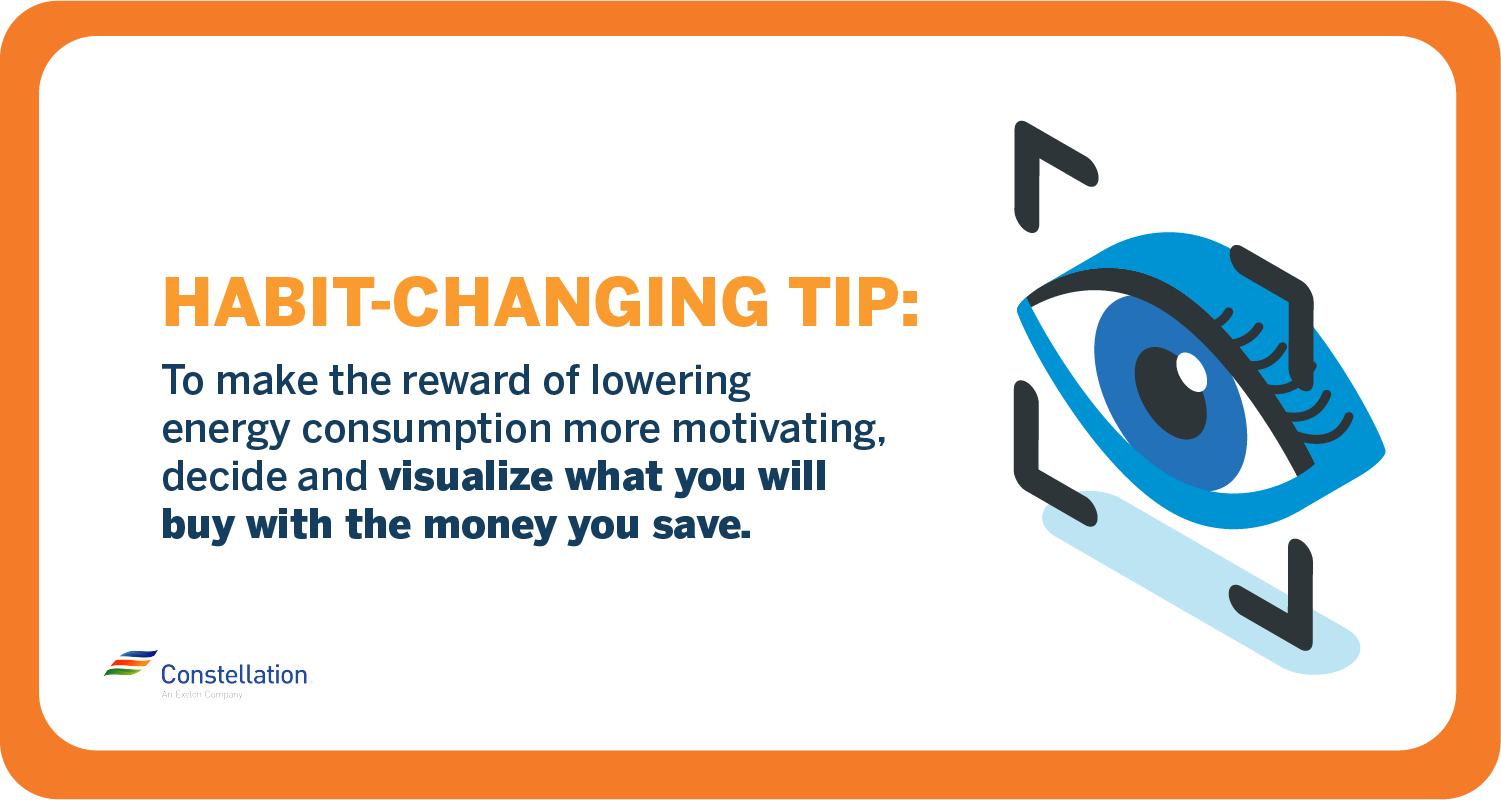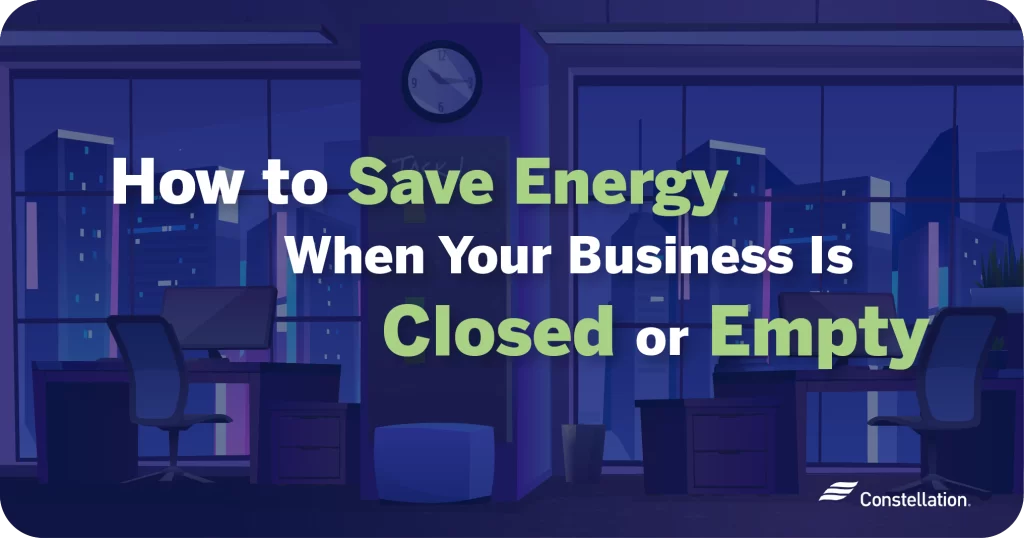
- Category:
Home Energy Savings -
Last updated:
August 17, 2022
Changing Your Energy Consumption Habits
Changing energy consumption habits might not be top of mind for many people, but small changes can have a big impact on your energy bill. And it pays in more ways than just on your monthly statement. For instance, it can also reduce your carbon footprint.
Fortunately, breaking bad energy consumption habits isn’t hard to do. With an understanding of how energy is wasted and how habits work, you can make some relatively easy adjustments and enjoy the benefits of reducing your energy usage.
What is energy consumption?
When we talk about energy consumption, we’re talking about all the energy used in your home during a given amount of time. For most people, electricity and natural gas are the main contributors to their average home energy usage. Using water consumes energy, too. Other sources may include propane or a renewable energy source for your home, like the electricity generated by solar panels. Taken together they all make up what energy consumption is for your home.
Is it important to cut energy usage?
Avoiding excessive energy consumption is good for your wallet. The less you use, the less you spend. And you don’t just save money today; you insulate yourself against possible future increases in the cost of energy.
Looking beyond your monthly bill, using less energy makes it easier for us to become more energy-independent, it cuts down on the number of wells, refineries and power plants we need, and it’s good for the environment. Cleaner landscapes and cleaner air lead to greater health. All in all, cutting back the amount of energy we use creates a circle of benefits.
How to change your energy consumption habits
Before thinking about changing your energy consumption habits, it’s helpful to understand how habits work. First, something has to cue the habit to trigger a series of behaviors. For instance, your alarm clock might ring and then you get ready for work, feed the dog and catch the train. All of those activities after the cue of the alarm clock become your routine. The reward can be anything from a smooth, stress-free morning to always making it to work on time — perhaps with a moment to enjoy a fresh cup of coffee before the rush of the day begins.
The interplay of cues, routines and rewards can change your energy consumption habits.
1. Identify your current energy consumption habits
Think about what your energy consumption is today and how you’re using energy. You should also look at the amount of energy you use. Perhaps you turn on the light in the front hall when you come home from work. Coming home is the cue for the routine of turning on the light. Perhaps you don’t turn it off again until you go to bed. Consider how much energy it takes to keep that light on for hours every night.

2. Determine the impact your habits are having
When you have inventoried how you’re using energy and how much, you can take a look at the impact of your routine. Understanding your energy costs is important. How many watt-hours and dollars are you spending on these habits? For instance, keeping lights on that you don’t need is how energy is wasted in many homes.
When your habits get translated into dollars and cents, you might find the motivation to make some changes that put a stop to wasting energy at home.
3. Eliminate obstacles and triggers
It’s one thing to identify your cues and habits, but quite another to change them.
In our example, you might want to change your habit and turn off the hall light once you’re settled in another room. To make it easier to switch off the light — and eliminate the obstacle of inconvenience — you could rewire and put light switches by every entrance and exit in your hall. A cheaper fix could simply be putting up a visible reminder, like the office etiquette signs you might be familiar with at work. That makes it easier to remember.
Another solution is to connect the light to your smart home system. You can program it to turn on when you typically arrive home, and then off a few minutes later. Home automation allows you to set the routine and the action that triggers it, thoughtfully in advance.
4. Visualize the reward
Think about the reward you get from changing your energy consumption habits. When you limit energy waste in your home, you can cut your energy bill. Going a step further, do more than think about ways to save energy at home — also focus on the reward. To make the reward more motivating, perhaps decide what you’ll buy with the money you save.

5. Develop new energy consumption routines
To arrive at new routines, you can’t do much to change your cues, but you can change your rewards. Take, for example, the cue of feeling cold. Instead of turning up the heat, you could put on a sweater and focus on what you might do with the money you save. The reward of a warmer home is replaced by the reward of funds freed up for something else you want.
Those savings can be used as the reward that changes routines in hot weather, as well, helping you save energy in the summer by doing things like shutting off your AC when you’re not home.
When you keep an eye on the rewards, you’ll be on your way to routines that lead to the benefits of reducing your energy usage. And if you use smart technology, like a smart thermostat, you can automate the best routines for your home and save yourself the work.
6. Don’t be hard on yourself
Habits are difficult to break. Changing your routine takes effort and thoughtfulness. It’s natural to go back to old ways of doing things, so don’t be too hard on yourself. Make your reward worth the effort and reward yourself regularly.
And if you slip back, adjust and stay focused on change. You can get inspiration with some of these energy savings tips. Despite your best intentions, it takes time and perseverance to create new routines.
The benefits of reducing your energy usage
From personal to global, the benefits of reducing your energy usage are many. You can:
- Reduce your energy bills
- Have extra money to spend on things you really want
- Reduce the impact on your budget for possible increases in energy costs
- Contribute to reducing our reliance of foreign fuels
- Cut down on domestic production
- Do you part for cleaner landscapes and air
Altering habits isn’t always easy. When it comes to addressing how energy is wasted in your home, however, the changes don’t have to be overwhelming. Start with small adjustments and keep an eye on the rewards and benefits. And consider the tech solution of automating some energy usage in your home to make things easier. But whatever strategy you choose, the rewards are well worth your effort.




